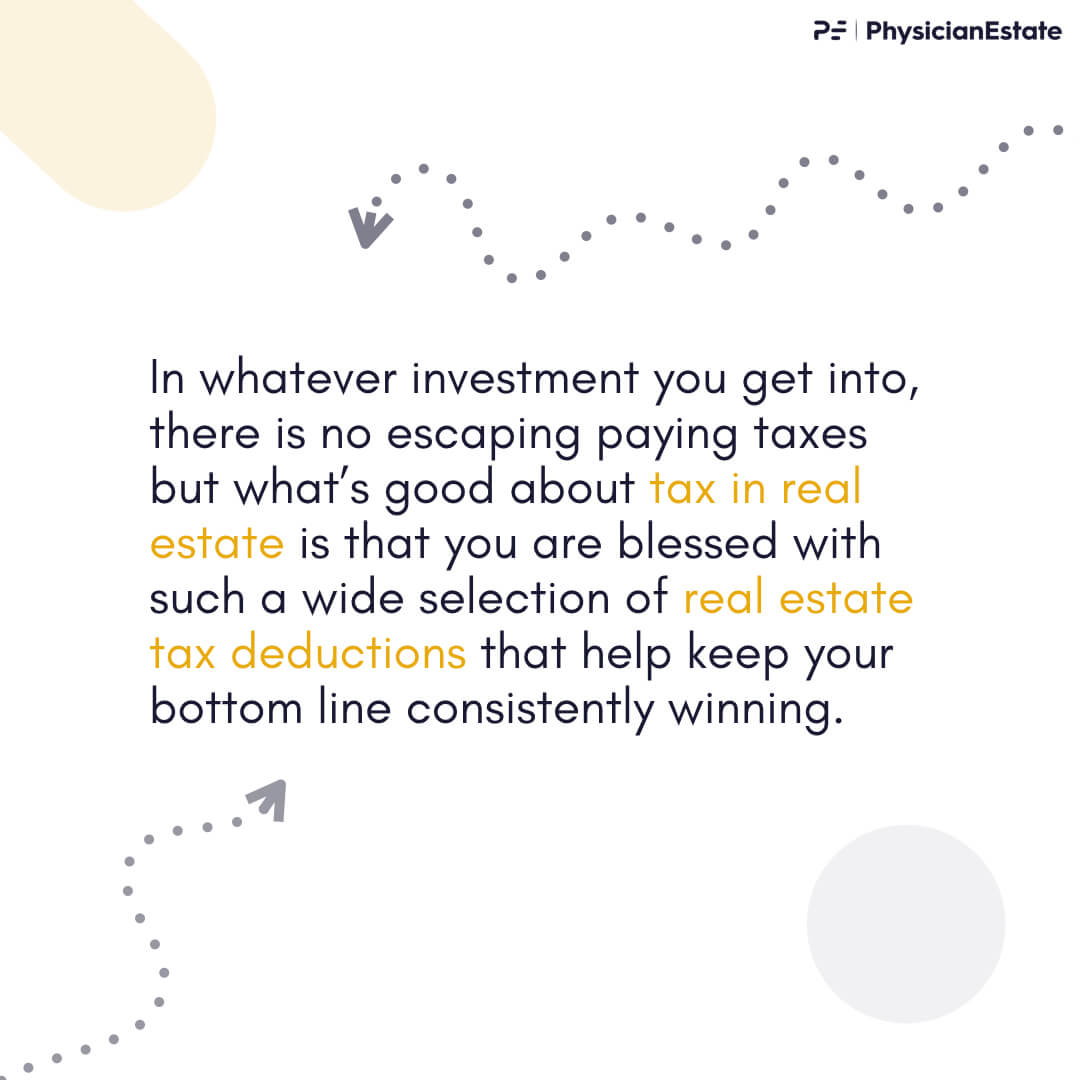“Property has its duties as well as its rights.” –Thomas Drummond
Why Learning About Tax in Real Estate is Important
Introduction | Tax in Real Estate
Here’s a little experiment. Try asking as many millionaires as you can about what they believe is the most reliable investment vehicle out there. We’re placing our bets on them saying that it’s real estate. It’s the safest, most worthwhile form of investment out there and here’s why. It’s a steady source of passive income. It pays down your loans for you. It builds your equity and diversifies your investment portfolio. Moreover, it protects you against inflation and provides you with real estate tax benefits like no other investment vehicle can.
In whatever investment you get into, there is no escaping paying taxes but what’s good about tax in real estate is that you are blessed with such a wide selection of real estate tax deductions that help keep your bottom line consistently winning. In fact, if you compare the benefits you get out of tax in real estate investments to that of, say, stocks, cryptocurrencies, or precious metals, you’ll come to realize that it really is a long stretch – this is something we discuss at length in this blog post. This time, we take off from that previous blog and dive into all the real estate taxes you should expect as a physician investor as well as a variety of tax laws and strategies that highlight the amazing benefits you get from tax in real estate.
What are the Different Types of Taxes in Real Estate?
Real Estate Taxes Which Physician Investors Pay For
- Property Taxes (also known as Real Estate Taxes)
- Physician investor or not, as long as you own a piece of land, you are due for property taxes. This is based on the assessed value of your land/property. As long as the property is under your name, you will still pay tax in real estate. Take note that some jurisdictions also tax business property or any non-real estate property which is affiliated with the investment. These include house equipment, furniture, and other items that increase the value of the property.
- Property tax is determined by multiplying the assessment value of a property by the local tax rate. Commercial real estate usually have higher tax rates than residential real estate. To settle property taxes for your real estate investments, you must file a Business Property Statement annually. After that, a professional assessor will determine the collective value of your property investments and the tax office will send over your tax bill.
- Capital Gains Taxes
- You are to pay this type of tax if you sell a property investment for more than what you paid for it. Your net proceeds are equivalent to the amount you sold the property for minus any costs affiliated with the sale. On the other hand, the cost is the sum of the price you paid for the property, the costs affiliated with buying the property (i.e. mortgage fees, appraisal fees, inspection fees, transfer taxes, and the like), and any maintenance and repair costs incurred.
- Tax is only applied to the “gain”, which is the profit, and not to the selling price or the net proceeds. To compute for a property’s gain, deduct the cost from the net proceeds. If you arrive at a negative number, this means you’ve incurred a loss. If it’s a positive number, it’s considered a gain, and that means you are eligible to pay capital gains tax.
- Different tax rates apply depending on how long you have owned the property. It is considered a short-term gain if you have owned the property for less than a year. Short-term gains are usually taxed as regular income. In contrast, an owned property is considered a long-term gain if you have owned it for more than a year. A pro-tip is to always vie for long-term gains because they receive a more favorable tax rate. With the help of long-term gains, you are also able to maximize previous deductions to lower your tax bill.
- Real Estate Income Taxes
- If you earn rental income from your real estate investments, this will be taxed as ordinary income. Your real estate income is the sum of everything you earn from rent minus any deductible expenses, such as maintenance and repair costs, mortgage, and the like.
Is Real Estate Tax Deductible?
Tax Laws that Help Deduct Tax Payments
As you will soon realize over the course of this blog, there is an entire spectrum of answers to the question, “Is real estate tax deductible?” In fact, there are a handful of laws which physician investors turn to when it comes to maximizing tax in real estate.
- Real estate tax deductions
- As an investor, you can deduct property expenses you have incurred from your tax bill. These include mortgage interest, property taxes, insurance, operating expenses, and maintenance repairs. You claim these real estate tax deductions the same year you incurred those expenses and report them to your Schedule E-Tax form.
- A very important tip we can impart to you is to itemize your deductions carefully. For physician investors, deductions may also include non-real estate activities such as using your home office. In many cases, you may also deduct portions of your home working expenses, such as wi-fi and mobile bills. For a full list of real estate tax deductions you can declare as a physician investor, click here.
- Depreciation
- Another way to reduce tax in real estate is to deduct a property’s depreciation via its buying and maintenance costs. This is normally viewed as an investor’s allowance for exhaustion or wear and tear of a property. Instead of deducting one collective amount, you spread the depreciation costs across the life of a property. According to the Internal Revenue Service (IRS), a residential property investment will spread depreciation over 27.5 years while a commercial property investment will spread depreciation for 39 years. To learn whether your property qualifies for depreciation deductions, click here. A rental property can be depreciated if it meets the following conditions:
- The property is under your name.
- The property is income-producing or is used as a means of business.
- The life of the property can be measured, meaning it is something that wears out, decays, becomes obsolete, or loses value over time because of natural causes.
- The property is expected to last for a minimum of one year.
- A very important detail to remember is that the area of land where the property is built must be subtracted from the depreciation cost. This is because the land itself does not wear out, become obsolete, or lose value over time.
- Another way to reduce tax in real estate is to deduct a property’s depreciation via its buying and maintenance costs. This is normally viewed as an investor’s allowance for exhaustion or wear and tear of a property. Instead of deducting one collective amount, you spread the depreciation costs across the life of a property. According to the Internal Revenue Service (IRS), a residential property investment will spread depreciation over 27.5 years while a commercial property investment will spread depreciation for 39 years. To learn whether your property qualifies for depreciation deductions, click here. A rental property can be depreciated if it meets the following conditions:
- Depreciation recapture
- If you decide to sell a rental property, depreciation will also play a role in the taxes you need to settle. This is because depreciation lowers your incurred costs, thus helping determine your loss or gain once you sell the property. Based on the reports that you have filed, the IRS takes note of the depreciation deductions you have taken and they’ll request for some of that money back. That’s what depreciation recapture means. It is based on your real estate income tax rate and is capped at 25%. This particularly applies to gains that are credited with the depreciation deductions you’ve already taken. To report depreciation recapture, you will need Form 4797, Sales of Business Property.
- In any case, if an investment property is sold at a loss, depreciation recapture won’t apply. As long as the property is under your name for at least a year, this loss is considered a Section 1231 loss and it can be used to reduce your tax liability within that tax year.
- Pass-through deductions
- Passive income, such as income you earn from real estate investments, are eligible for pass-through deductions according to the Tax Cuts and Job Act of 2018. These are deductions that enable profitable businesses who earn qualified business income (QBI) to deduct up to 20% of their net business income, reducing your effective income tax rate by 20%. This law is available until 2025 only. There are many rules and restrictions to this tax saving strategy. Be sure to check with your CPA.
- Capital gains exclusion
- As a physician investor, this is a real estate tax benefit you need to be in on. Capital gains exclusion is a very lucrative tax item for homeowners. It applies when you sell your MAIN home. This can be used more than once by homeowners as an exemption from paying taxes for profits up to $500,000 from selling their home. On the flip side, if capital losses exceed capital gains, you are still allowed to offset a minimum of $3,000 worth of other income. Major win.
Tax-saving Strategies
How to Take Advantage of Tax in Real Estate
- Make sure your property assessments are accurate.
- According to the National Taxpayers Union, a non-profit organization that promotes lower taxes, over 60% of properties across the States are over assessed. In order to save on tax in real estate, a common strategy is to challenge your property assessments. Have your properties checked by a trusted assessor so that the values that are reported annually are correct and updated.
- Settle your tax bill as early as possible.
- Depending on where you reside, some states have laws where you may be eligible for tax discounts if you settle your tax dues early. Coordinate with your local tax office with regard to any applicable real estate tax deductions, exemptions or other real estate tax benefits which are made available in your area.
- Maximize the 1031 Exchange.
- This exchange allows you to defer paying capital gains taxes when you sell an investment property. Also referred to as a like-kind exchange or a “Starker”, the 1031 Exchange is one of many reliable real estate tax benefits. It gives you the chance to swap your investment property for another. Technically speaking, you are selling your property to buy a similar property, avoiding paying capital gains tax in the process. Although you are exempted from paying capital gains taxes, you must still accomplish a report stating the 1031 exchange on Form 8824, Like-Kind Exchanges. For a more in-depth discussion on the qualifications and step-by-step procedure of filing a 1031 Exchange, click here.
- Being active in the real estate business and updating your Real Estate Professional Status (REPS) already makes you eligible for real estate tax deductions.
- Here’s something worth getting excited about: Real Estate Professional Status is one of the very few ways you can shelter your W-2 income from being taxed. Yes, you heard it right. If you qualify as a real estate professional, you can take all the paper losses (real estate depreciation) and carry those to shield your W-2 income from being taxed. In a separate blog, we discuss everything you need to know about how you can qualify for Real Estate Professional Status, including a how-to guide. Click here to learn more.
- Make the most out of tax-deferred retirement accounts.
- For physician investor beginners, tax-deferred retirement accounts are especially helpful because it allows you to invest on real estate and pay your taxes later on. This is an opportunity offered by some health savings accounts (HSA) and individual retirement accounts (IRA). Some accounts have yearly contribution limitations as well as restrictions with regard to the type of investments you can make, so make sure to do some research.
Summary
Understanding how you can benefit from tax in real estate is a crucial way to achieve long-term wealth. As you have read, there are lots of answers to the question, “Is real estate tax deductible?” Depending on each investment, your real estate tax deductions can play out in many different ways. By being mindful of the real estate tax benefits that are made available to you, you keep your real estate income steady and allow your financial bottom line to grow. Because the tax landscape is complicated and ever evolving, it also helps to have a trusted tax accountant or CPA in your corner. They will surely help you take advantage of any real estate tax benefits that are available and get the most favorable tax bill possible.
Here at PhysicianEstate, we welcome all physician entrepreneurs to learn about commercial real estate investments, rental property investments, and wealth generation. We encourage all physicians to eventually become real estate physician investors. We know a great deal about Who – What – Why – How.
Stay in touch with us by signing up for our newsletter. The newsletter will keep you up to speed on the current real estate investments we are looking at, provide physicians with investment opportunities, and much more.
Legal Disclaimer: This is not investment advice. I am not a legal and/or investment advisor. This is my personal blog, and all information found here, including any ideas, opinions, views, predictions, forecasts, commentaries, suggestions, or stock picks, expressed or implied herein, are for informational, entertainment or educational purposes only and should not be construed as personal investment advice. These are my views, it is not a production of my employer, nor is it affiliated with any broker/dealer or registered investment advisor. While the information provided is believed to be accurate, it may include errors or inaccuracies. To the maximum extent permitted by law, PhysicianEstate disclaims any and all liability in the event any information, commentary, analysis, opinions, advice and/or recommendations prove to be inaccurate, incomplete or unreliable, or result in any investment or other losses. You should consult with an attorney or other professional to determine what may be best for your individual needs. Your use of the information on the website or materials linked from the Web is at your own risk.




















